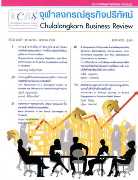A Comparison of Corporate Social Responsibility between Multinational Corporations from Developed Countries and Thai Multinational Corporations in Thailand
Main Article Content
Abstract
บทคัดย่อ
วัตถุประสงค์ของงานวิจัยนี้เพื่อเป็นการศึกษาถึงแรงจูงใจหรือปัจจัยที่มีอิทธิพลต่อความรับผิดชอบต่อสังคมของบริษัทข้ามชาติของประเทศที่พัฒนาแล้ว และบริษัทข้ามชาติของไทย ลักษณะเด่นของการแสดงความรับผิดชอบต่อสังคม และเปรียบเทียบความเหมือนและความต่างของแรงจูงใจและการแสดงความรับผิดชอบต่อสังคมของบริษัทระหว่างบริษัททั้งสองประเภทนี้ การศึกษานี้เป็นงานวิจัยเชิงคุณภาพ โดยอิงอยู่บนทฤษฎีที่เกี่ยวกับความรับผิดชอบต่อสังคมของบริษัทสี่ทฤษฎี ได้แก่ ทฤษฎีทางสถาบัน (Institutional Theory) ทฤษฎีสองมิติของความรับผิดชอบต่อสังคมของบริษัท (Two-dimensional Theory of CSR) โมเดลเกี่ยวกับผลการดำเนินงานทางสังคมของบริษัท (Conceptual Model of Corporate Social Performance) และทฤษฎีผู้มีส่วนได้ส่วนเสีย (Stakeholder Theory) จากการสัมภาษณ์เชิงลึกของบริษัทข้ามชาติหกรายซึ่งประกอบด้วยบริษัทข้ามชาติของประเทศพัฒนาแล้วสามรายและบริษัทข้ามชาติของประเทศไทยสามราย พบว่าทั้งหกบริษัทถือว่าความรับผิดชอบต่อสังคมของบริษัทเป็นส่วนหนึ่งของการดำเนินงานทางธุรกิจและเน้นว่าเป็นจุดเด่นของบริษัท บริษัทข้ามชาติของประเทศพัฒนาแล้วทั้งสามแห่งชี้ให้เห็นว่าความรับผิดชอบต่อสังคมของบริษัทของสาขาที่อยู่ในประเทศไทยได้รับอิทธิพลมาจากความต้องการของประเทศไทยเองมากกว่ามาจากนโยบายของบริษัทแม่ ทั้งหกบริษัทไม่ได้จำกัดกิจกรรมความรับผิดชอบต่อสังคมของบริษัทแค่เฉพาะที่เกี่ยวข้องกับอุตสาหกรรมที่ตนอยู่เท่านั้น แต่จะเน้นถึงกิจกรรมที่เกี่ยวกับสังคมและสิ่งแวดล้อมโดยทั่วไปด้วย จุดอ่อนที่เหมือนกันประการหนึ่ง คือไม่มีการวัดผลความสำเร็จของกิจกรรมทางความรับผิดชอบต่อสังคมของบริษัท ส่วนความแตกต่างที่สำคัญประการหนึ่งคือ บริษัทข้ามชาติของประเทศพัฒนาแล้วมักจะสื่อสารกิจกรรมความรับผิดชอบต่อสังคมของบริษัทให้ผู้มีส่วนได้ส่วนเสียทั้งภายในและภายนอกองค์กรให้รับทราบ เพื่อเป็นการรักษาความสัมพันธ์ที่ดีกับผู้มีส่วนได้ส่วนเสียเหล่านั้น ในขณะที่บริษัทข้ามชาติของไทยไม่ได้ให้ความสนใจในการสื่อสารนี้ กล่าวโดยสรุป บริษัทข้ามชาติของไทยควรที่จะพิจารณาการจัดทำมาตรวัดผลความสำเร็จของกิจกรรมทางความรับผิดชอบต่อสังคมของบริษัท โดยวัดจากประสิทธิผลที่เกิดขึ้นกับบุคคลหลาย ๆฝ่ายในสังคม การวัดผลความสำเร็จนี้มีประโยชน์ในการตรวจสอบว่าการใช้จ่ายเงินในกิจกรรมความรับผิดชอบทางสังคมของบริษัทเป็นไปอย่างมีประสิทธิภาพหรือไม่ นอกจากนี้ บริษัทข้ามชาติของไทยควรมีการสื่อสารกิจกรรมความรับผิดชอบต่อสังคมของบริษัทต่อผู้มีส่วนได้ส่วนเสียทั้งภายในและภายนอกองค์กรให้มากขึ้น เพื่อให้พนักงานภายในองค์กรตระหนักถึงความสำคัญและสนับสนุนกิจกรรมเพื่อความรับผิดชอบทางสังคมของบริษัท และเพื่อสร้างความร่วมมือจากบุคคลภายนอกด้วย
คำสำคัญ: ความรับผิดชอบต่อสังคมของบริษัท, บริษัทข้ามชาติ, ประเทศไทย
AbstractThe objectives of this research are to study the motivation or factors influencing corporate social responsibility (CSR) of multinational corporations (MNCs) from developed countries and those from Thailand, distinct characteristics of CSR applications, and to compare and contrast motivations and applications of CSR between these two types of companies. This study is a qualitative research being based on four CSR related theories namely: the institutional theory, the two-dimensional theory of CSR, the conceptual model of corporate social performance, and the stakeholder theory. Top executives from six MNCs, of which three companies are from developed economies and the other three are from Thailand, were interviewed in depth. The key findings are that all six companies have treated CSR as part of their business operations and emphasized as companies’ focus. Three MNCs from developed economies indicated that their CSR of their subsidiaries in Thailand is influenced by the needs of Thailand more than by headquarters’ policies. All six companies did not limit their CSR activities only to those related to their industries. Rather, they emphasized on the general social and environmental activities. One common weakness was the lack of success measure of CSR activities. One significant difference was that MNCs from developed economies normally communicated their CSR activities to both internal and external stakeholders in order to keep good relationship with them while MNCs from Thailand did not put much emphasis on the communication. In conclusion, MNCs from Thailand should consider developing measures of CSR success which should be measured from the effectiveness borne with multiple parties in the society. Success measurement is beneficial in checking whether CSR spending is efficient or not. In addition, Thai MNCs should communicate their CSR activities more to both internal and external stakeholders so that their employees will realize the importance of and support the CSR activities as well as to develop collaboration with external parties.
Keywords: Corporate social responsibility, multinational companies, Thailand
Article Details
Opinions and discussions in papers published by the Creative Business and Sustainability Journal (CBSJ) are deemed as personal opinions and the responsibility of the writers. They are not the opinions or responsibility of the Chulalongkorn Business School of Chulalongkorn University.
Papers, content, information etc. appearing in the Journal are deemed to be the copyright property of the Chulalongkorn Business School of Chulalongkorn University. Anybody or any organization that wishes to publish any part of them or use them in any way must obtain written permission from the Chulalongkorn Business School, Chulalongkorn University.


